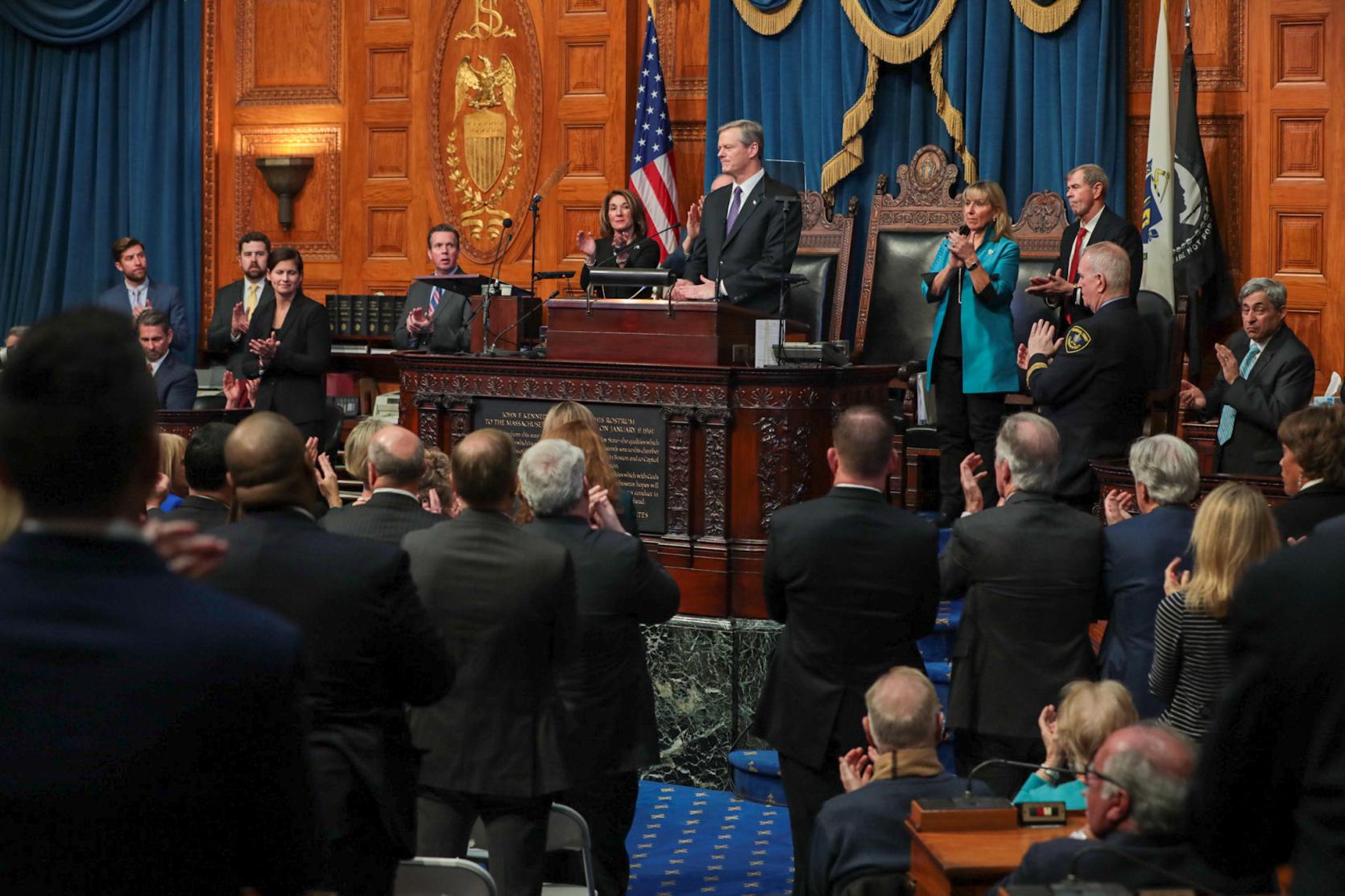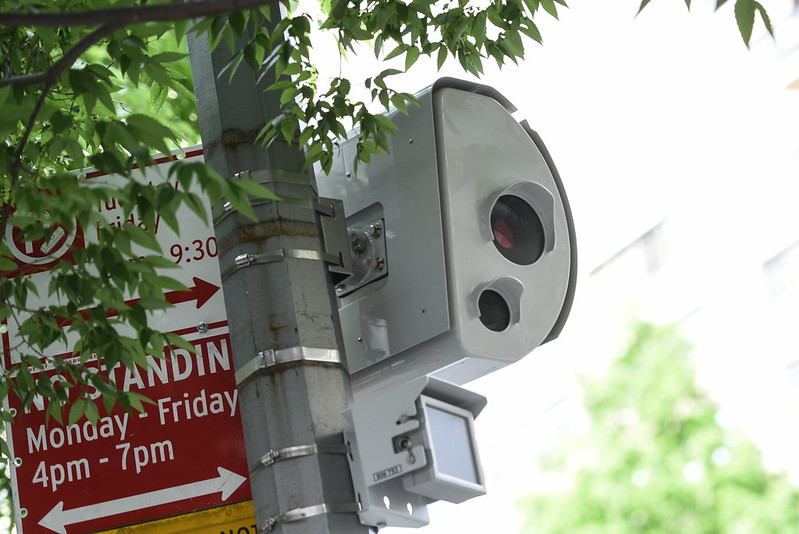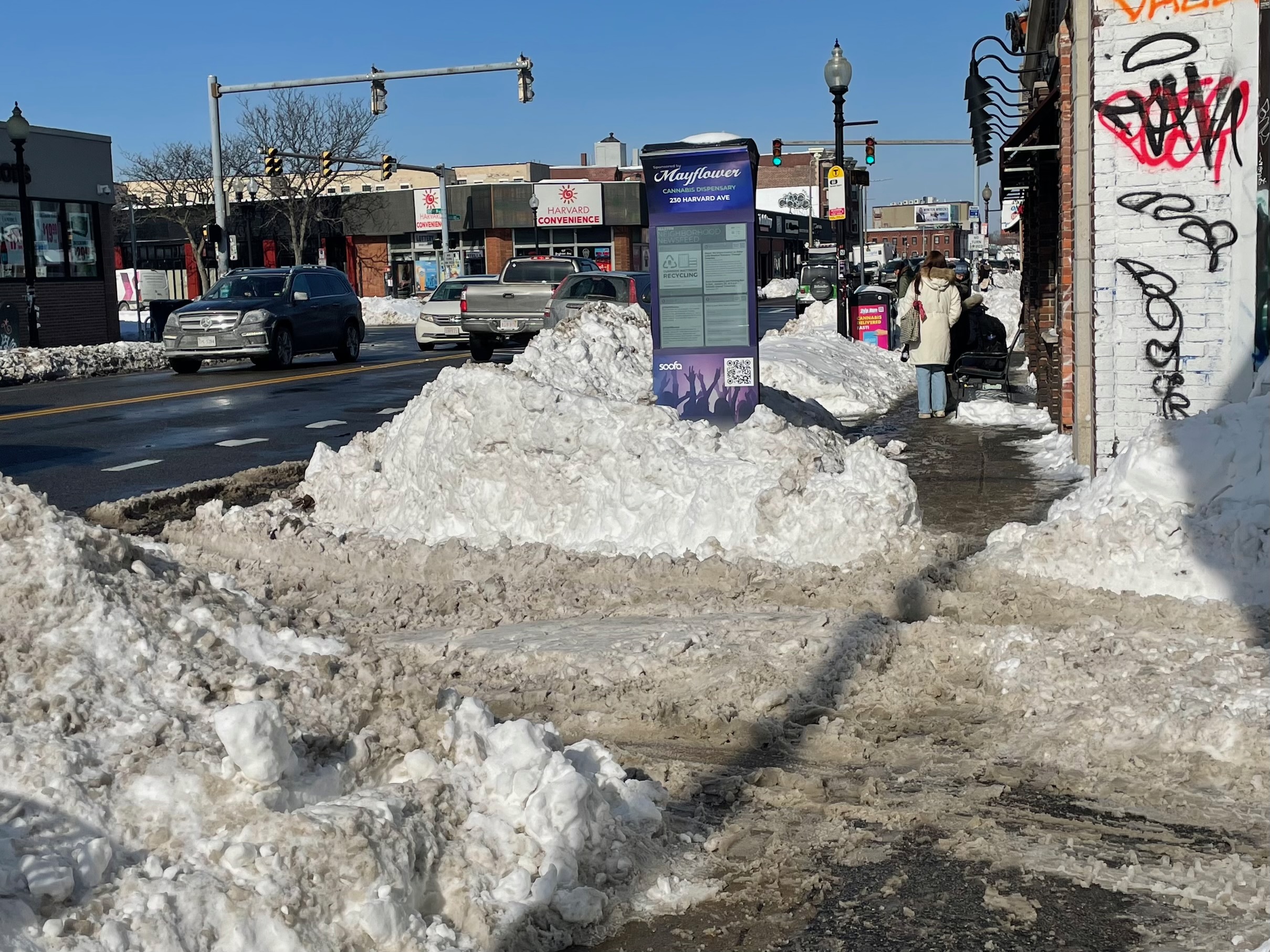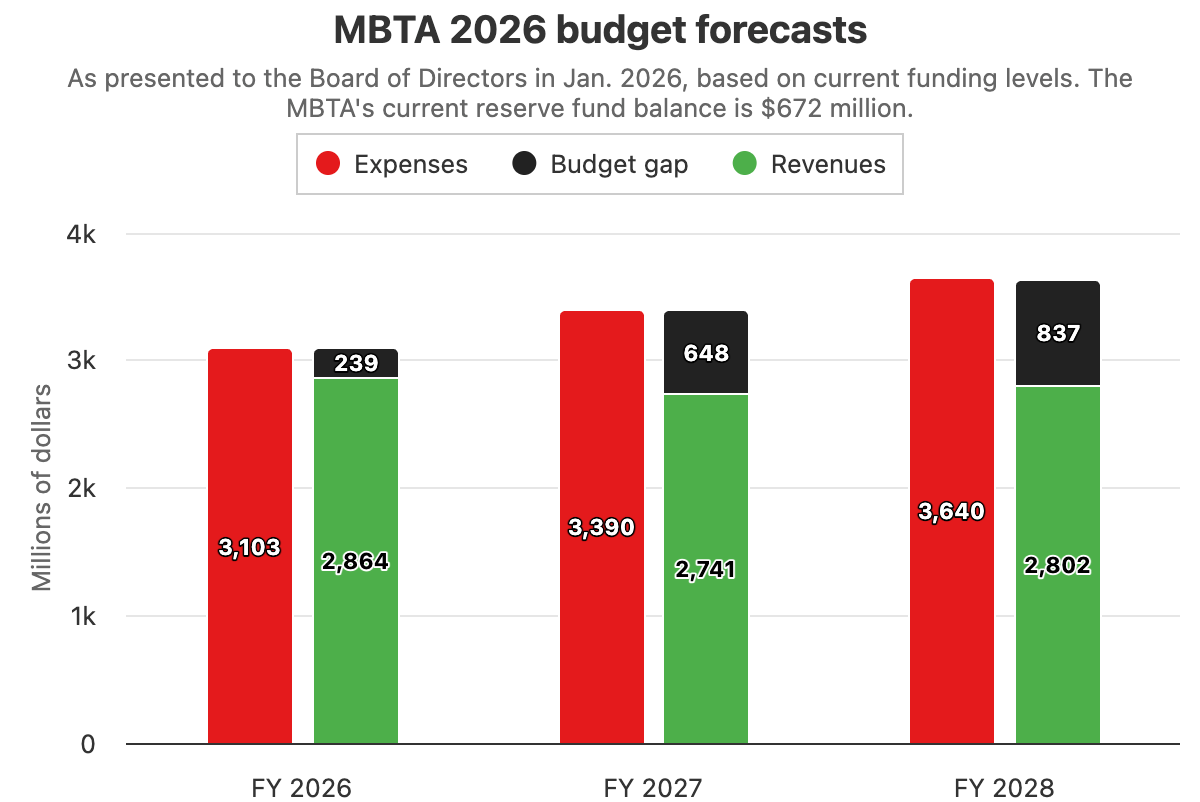MassBudget is a nonprofit think tank that conducts research and analysis on economic and budget policy in Massachusetts, with a particular focus on improving the lives of moderate- and low-income residents. This guest post is part of a MassBudget series looking ahead at some major stories to watch for in the Fiscal Year (FY) 2021 budget debate. StreetsblogMASS will share additional briefs and analysis from MassBudget as new budget proposals are released by the Governor and legislative bodies.
For years the Baker Administration said the state’s transportation problems could be best addressed through management reforms rather than more funding. The Governor’s FY 2021 budget proposal acknowledges the need for more investment. It partly reverses some earlier cuts to transportation programs that have likely held back performance of the existing system.
Below are some transportation-related highlights from the Governor’s FY 2021 budget.
(Throughout this brief, you will see words in bold. These terms are defined in a glossary at the end of the report.)
Higher fees on ride-hailing services like Lyft and Uber, with revenue largely dedicated to transportation

The biggest change in the Governor’s budget is a proposed increase in the existing fee for trips by a Transportation Network Company (TNC) such as Lyft or Uber. The anticipated revenue increase coincides with an equal increase in the Commonwealth’s transfer to the Massachusetts Bay Transportation Authority (MBTA). The fee increase from 20 cents to $1 per trip is expected to yield approximately $100 million, with 70 percent dedicated to the Commonwealth Transportation Fund (CTF).
Every year, the CTF transfers state funds to the MBTA and the Governor anticipates this ride-hailing fee increase will give the MBTA a $73 million boost in FY 2021. This boost would bring the total transfer for the MBTA to $200 million, almost restoring operating assistance to FY 2016 or FY 2017 levels, after adjusting for inflation.
The Governor’s proposal would quintuple the current TNC charge, but the resulting charge would remain well below other cities like New York or Chicago. In Chicago, for instance, the fee on a private TNC ride is $1.25 in most areas, $3 downtown, and $8 for the airport. In New York, the fee for rides originating south of Manhattan’s 96th Street is $2.75.
Making fees higher downtown and for unshared rides reduces traffic congestion by encouraging people to share a vehicle and to take transit instead of a vehicle downtown. Evidence from Chicago suggests it is more equitable to charge lower fees outside of downtown and for shared rides, since ride-hailing data suggests that these rides tend to originate from neighborhoods where people are more likely to have lower incomes and be people of color.
Related:
Fees On Uber and Lyft Accelerate Local Sustainable Transport Projects
Fees on TNC rides may be less regressive than other transportation user fees like gas taxes. It’s hard to know because companies disclose little information to determine how many trips originate in low-income communities (the Governor’s proposal would require companies to share more information with the Commonwealth). High-income residents probably tend to spend more on TNC trips, but the money they spend on fares likely represents a far smaller share of their incomes. Because these fees get at least partially passed on to riders, they are likely to impact low-income riders more than those with high incomes.
Increased funding for the MBTA, only some of which is new
The Governor anticipates an additional $134.8 million in funding for the MBTA in FY 2021.
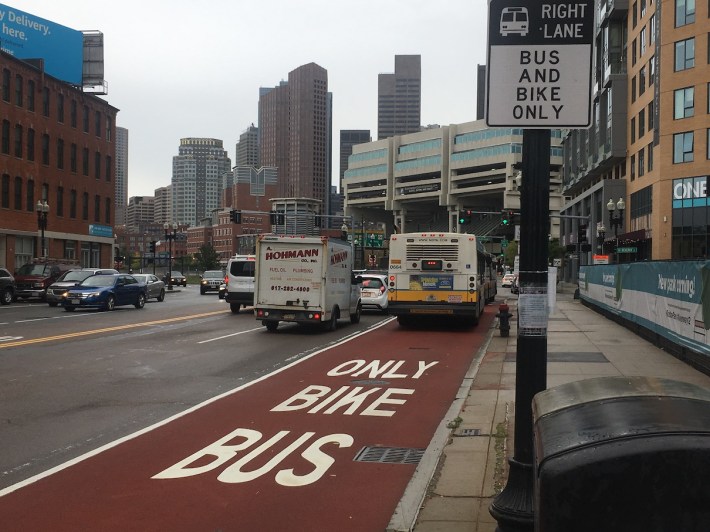
Of this amount, $73 million would come from the proposed fee increase on ride-hailing services, described above.
The Governor anticipates $21.8 million of this increase will come from the robust economy pushing up sales tax receipts, 16 percent of which are dedicated to the MBTA’s operating budget. This occurs automatically due to a law enacted in 1999, and would not be a result of the Administration’s proposal.
The MBTA would also receive a one-time boost of $40 million in sales tax funds in FY 2021 due to the Administration’s proposed acceleration of sales tax payments from vendors.
Increased MassDOT funds bring levels nearer to 2015
The Governor’s budget includes $77.6 million in additional funds for the Massachusetts Department of Transportation (MassDOT) compared to FY 2020, by increasing the Massachusetts Transportation Trust Fund (MTTF) outlay to $423.5 million.
Over half of this amount —$40 million — is for an increase for snow and ice removal, which otherwise tends to get underfunded in the budget and paid for in a later supplemental budget.
The Administration reports that it will direct $8.6 million of this increase for additional staff at the Registry of Motor Vehicles (RMV), where overstretched staff was cited in safety problems this past year.
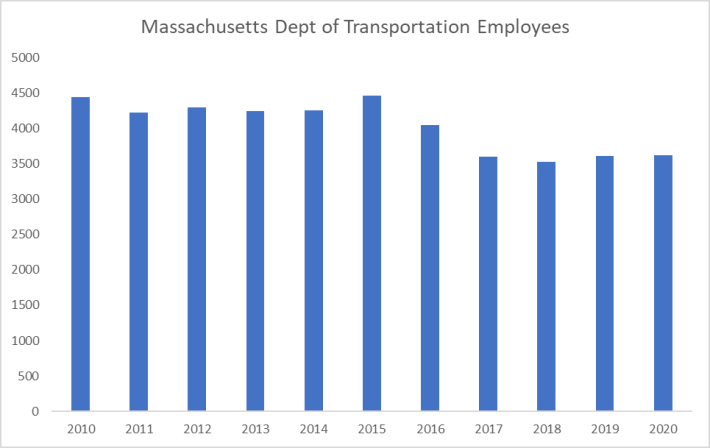
The remaining $29 million increase represents 6.9 percent of the total proposed MTTF budget, and could begin to enhance capacity at MassDOT. Inadequate staffing at the Department can impair the ability to oversee contracting for capital projects, among other problems.
According to the State Comptroller, MassDOT staffing levels are 18.9 percent below where they stood in 2015. Despite some increase in the last two years, almost 850 fewer employees worked at MassDOT in January 2020 compared to five years earlier. The Governor’s proposed funding for the MTTF remains $53 million below FY 2015 levels, after adjusting for inflation:
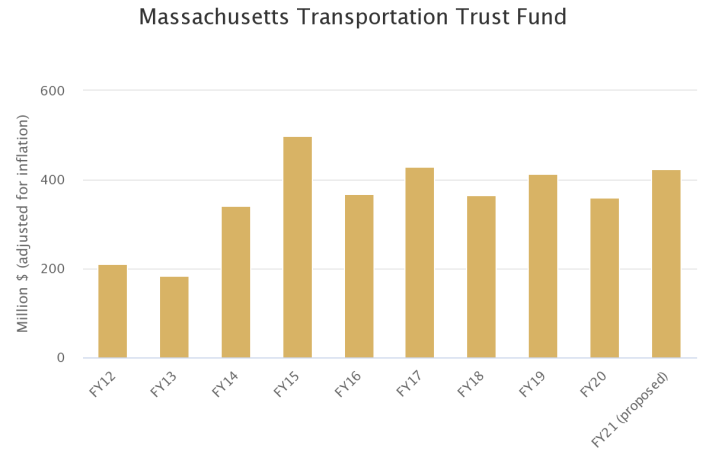
Regional transit authorities see boost, but smaller than FY 2019 increase
To support the 15 Regional Transit Authorities (RTAs) outside the MBTA service area, the Governor’s budget proposes $94 million, a $3.5 million increase over FY 2020. The increment would be $1 million more than the FY 2020 increase of $2.5 million, but substantially less than the FY 2019 increase of $7.6 million.
Glossary
Capital projects: Typically, large investments in durable public infrastructure such as bridges, electrical systems, or new train cars are made through the capital budget. These investments don’t occur each year. They are typically paid for through public borrowing that is paid back over many years.
Commonwealth Transportation Fund (CTF): A fund that receives dedicated revenues – mostly from gas taxes, vehicle registration and inspection fees, and sales taxes on vehicle sales – to make transportation-related debt payments and other transfers to transportation entities. The CTF is a key intermediary in the state’s complex funding system for transportation.
Massachusetts Transportation Trust Fund (MTTF): A fund that sits outside the Commonwealth’s budget as a financial instrument for the Department of Transportation and supports the Department’s operating budget. It is the repository for dedicated revenues from quasi-independent toll agencies, federal government grants, and some budgeted money from the state.
Regional Transit Authorities (RTAs): Public bus and shuttle systems that operate outside the MBTA area and are quasi-independent from the state government. They receive support from the state and federal government and agree to memorandums of understanding with the Massachusetts Department of Transportation about practices and reporting.
Supplemental budget: An additional budget that provides more funding to certain state programs and services to fill shortfalls.
Phineas Baxandall is a Senior Analyst at the Massachusetts Budget and Policy Center (MassBudget), where he focuses on transportation and public revenue policy.
